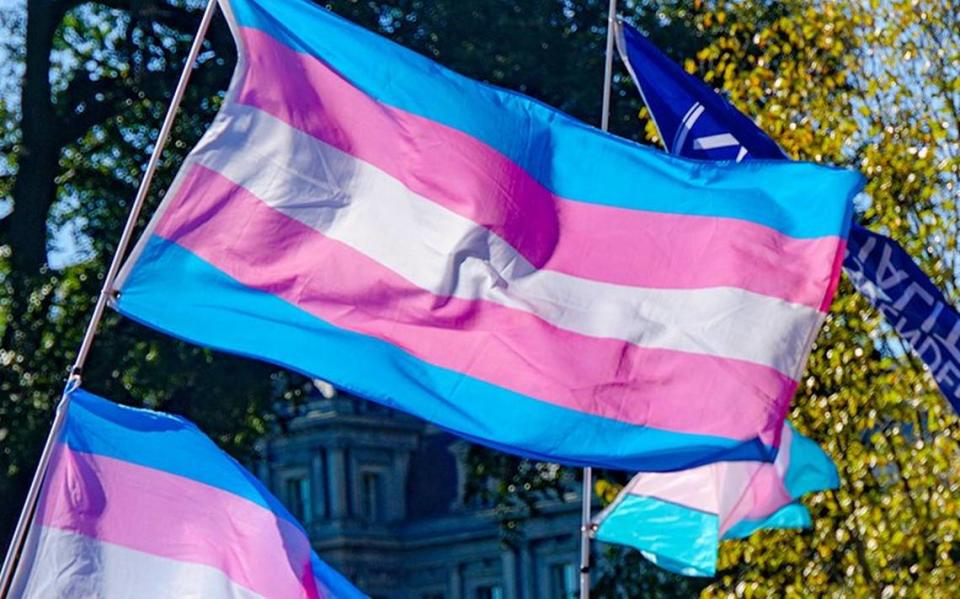KS House passes ban on trans women in female spaces, labels intersex people as disabled

The Kansas House approved a bill which would bar transgender from entering single-sex spaces such as domestic violence shelters, bathrooms and prison wards.
The “Women’s Bill of Rights” passed the House 83 to 41. The Senate must review the House’s changes to the bill before it can head to Gov. Laura Kelly. Kelly, a Democrat, has been critical of the Legislature’s targeting of the transgender community this session and previously vetoed a bill banning transgender athletes from women’s sports.
Aphra Maria Karaya, a 27-year-old Wyandotte County transgender woman, said this bill contextualized within a wave of anti-trans legislation shows the Legislature deems transgender people “acceptable sacrifices” when pursuing an agenda of “moral purity.”
She said the legislation would lead to increased rates of suicide, self-harm, violence and turmoil within the transgender community due to lawmakers’ continued “othering” of transgender people.
A 2020 study by the National Library of Medicine found that 82% of transgender individuals have considered suicide and an additional 40% of transgender people have attempted suicide, with increased rates in transgender youth.
“It’s going to lead to children dying and that death is going to be on their hands,” she said. “It’s not going to be anywhere else. It rests squarely on the legislatures’ hands.”
Rep. Brenda Landwehr, a Wichita Republican, said the bill strictly defines male and female and does not mention transgender people. She said the bill aims to “ensure that our current protections for women’s spaces are not eroded by courts or unaccountable executive actions.”
“We talk about rights,” she said. “What’s the rights of a woman? You’re saying I have no more rights. I can’t go into a woman’s bathroom and know that a male will not walk into that bathroom. What about my rights? What about my comfort zone?”
The vote largely split along party lines, but two freshman Democrats, Kansas City Rep. Marvin Robinson and Rep. Ford Carr, joined majority Republicans in passing the bill. Three Republicans, Reps. Mark Schreiber of Emporia, Jesse Borjon of Topeka and David Younger of Ulysses voted against the bill.
Iridescent Riffel, a graduate student at the University of Kansas who is transgender, said the legislation reflects a misunderstanding of transgender people and arises from a national effort to crack down on their identity.
“It tells trans people we aren’t welcome, we’re not cared about, we’re not valued and that Kansas is not a safe place for us to live,” she said.
Karaya said that trans women are women who deserve protections rather than restrictions on what spaces they are allowed to enter.
“I don’t care what this law says,” Karaya said. “I’m still going to be going into women’s restrooms and all women’s spaces because that’s exactly what I am.”
Changes to bill would define intersex people as disabled
The original bill, which defined sex based on the presence of ova in females and the ability to fertilize ova in males, included no provisions for individuals who did not fit within the sex binary, making the bill’s consequences for intersex people unclear.
Rep. John Eplee, an Atchison Republican, introduced an amendment last week to the bill that would categorize intersex people, or individuals with a variety of combinations of male and female biological traits, as disabled and provide them with “accommodations and protections” under the Americans with Disabilities Act.
During a House Committee on Health and Human Services hearing earlier this month, Eplee said intersex people should be provided their own space to change or use the restroom to afford them “privacy and safety,” adding that this amendment is the “best solution we can come up with in the world we live in today.”
Landwehr said intersex students could use faculty changing rooms or restrooms with someone standing outside the door.
Lawmakers, however, did not specify how intersex people could be accommodated in other single-sex spaces outlined in the bill, such as prison wards or domestic violence shelters.
Rep. Susan Ruiz, a Shawnee Democrat, said categorizing intersex people as disabled “simply because they’re born with differences in sex development” is upsetting to many people.
“I really don’t want to insult them in that way,” said Ruiz, the first lesbian elected to the Kansas House
Rep. Ron Bryce, a Coffeyville Republican, said the amendment ensures that intersex people are protected under the bill’s language.
“We don’t wanna marginalize them anymore,” he said. “This amendment makes it very clear that we’re showing them the respect they deserve.”
Justin Tsang, who is intersex and is disabled, said labeling intersex people as disabled is inaccurate, though they may “face disabling situations” due to discrimination from doctors and society and “invasive” health procedures, such as nonconsensual surgeries.
They added that separate accommodations could lead to “targeted violence or discrimination” because intersex individuals could be seen as “someone who intentionally needs to be treated differently from the rest of the public.”
“Intersex people do not generally meet the criteria of having a disability under the ADA,” he said. “It would seem to reinforce that our bodies need changing. But in reality, our bodies are a natural part of human diversity that should not be further stigmatized.”
Tsang, a Board Member at InterConnect, an organization which advocates for intersex people, said encouraging “spaces not based on a sex binary,” such as all-gendered bathrooms, would be comforting and ensure equal access for intersex, transgender and gender non-conforming people.
Taryn Jones, a lobbyist for Equality Kansas, the state’s leading LGBTQ rights organization, said the bill has “nothing to do with women’s rights” and only fosters discrimination.
“Supporters of the bill talk about safety and wanting to feel safe,” she said. “But what happens when someone born female comes into a women’s restroom or locker room looking and being completely male? How is that supposed to make a woman feel safe?”
The Star’s Katie Bernard contributed to this report.

 Yahoo Sports
Yahoo Sports 